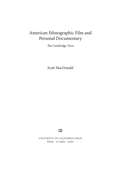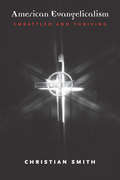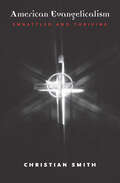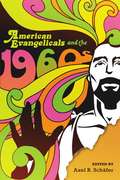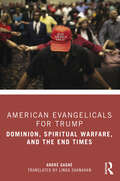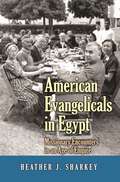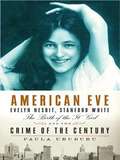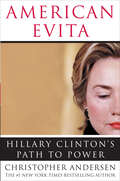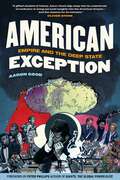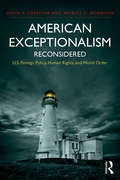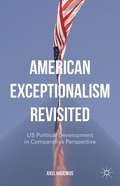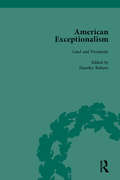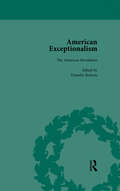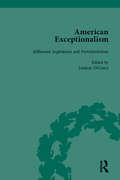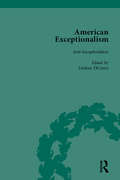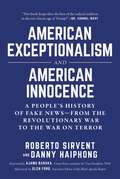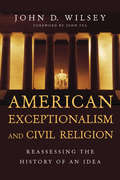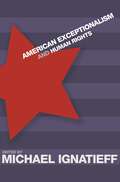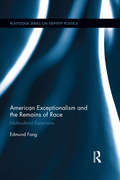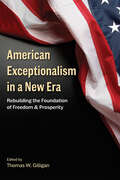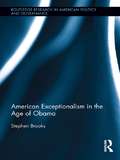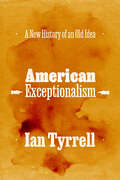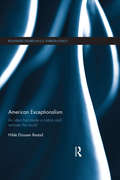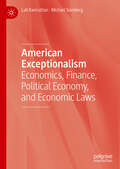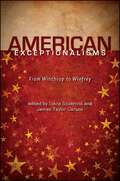- Table View
- List View
American Ethnographic Film and Personal Documentary
by Scott MacdonaldAmerican Ethnographic Film and Personal Documentary is a critical history of American filmmakers crucial to the development of ethnographic film and personal documentary. The Boston and Cambridge area is notable for nurturing these approaches to documentary film via institutions such as the MIT Film Section and the Film Study Center, the Carpenter Center and the Visual and Environmental Studies Department at Harvard. Scott MacDonald uses pragmatism's focus on empirical experience as a basis for measuring the groundbreaking achievements of such influential filmmakers as John Marshall, Robert Gardner, Timothy Asch, Ed Pincus, Miriam Weinstein, Alfred Guzzetti, Ross McElwee, Robb Moss, Nina Davenport, Steve Ascher and Jeanne Jordan, Michel Negroponte, John Gianvito, Alexander Olch, Amie Siegel, Ilisa Barbash, and Lucien Castaing-Taylor. By exploring the cinematic, personal, and professional relationships between these accomplished filmmakers, MacDonald shows how a pioneering, engaged, and uniquely cosmopolitan approach to documentary developed over the past half century.
American Evangelicalism: Embattled and Thriving
by Christian SmithEvangelicalism is one of the strongest religious traditions in America today; 20 million Americans identify themselves with the evangelical movement. Given the modern pluralistic world we live in, why is evangelicalism so popular? Based on a national telephone survey and more than three hundred personal interviews with evangelicals and other churchgoing Protestants, this study provides a detailed analysis of the commitments, beliefs, concerns, and practices of this thriving group. Examining how evangelicals interact with and attempt to influence secular society, this book argues that traditional, orthodox evangelicalism endures not despite, but precisely because of, the challenges and structures of our modern pluralistic environment. This work also looks beyond evangelicalism to explore more broadly the problems of traditional religious belief and practice in the modern world. With its impressive empirical evidence, innovative theory, and substantive conclusions, American Evangelicalism will provoke lively debate over the state of religious practice in contemporary America.
American Evangelicalism: Embattled and Thriving
by Paul Kennedy Michael Emerson Christian Smith Sally Gallagher David Sikkink&“An excellent study of evangelicalism&” from the award-winning sociologist and author of Souls in Transition and Soul Searching (Library Journal). Evangelicalism is one of the strongest religious traditions in America today; twenty million Americans identify themselves with the evangelical movement. Given the modern pluralistic world we live in, why is evangelicalism so popular? Based on a national telephone survey and more than three hundred personal interviews with evangelicals and other churchgoing Protestants, this study provides a detailed analysis of the commitments, beliefs, concerns, and practices of this thriving group. Examining how evangelicals interact with and attempt to influence secular society, this book argues that traditional, orthodox evangelicalism endures not despite, but precisely because of, the challenges and structures of our modern pluralistic environment. This work also looks beyond evangelicalism to explore more broadly the problems of traditional religious belief and practice in the modern world. With its impressive empirical evidence, innovative theory, and substantive conclusions, American Evangelicalism will provoke lively debate over the state of religious practice in contemporary America. &“Based on a three-year study of American evangelicals, Smith takes the pulse of contemporary evangelicalism and offers substantial evidence of a strong heartbeat . . . Evangelicalism is thriving, says Smith, not by being countercultural or by retreating into isolation but by engaging culture at the same time that it constructs, maintains and markets its subcultural identity. Although Smith depends heavily on sociological theory, he makes his case in an accessible and persuasive style that will appeal to a broad audience.&” —Publishers Weekly
American Evangelicals and the 1960s
by Axel R. SchäferIn the late 1970s, the New Christian Right emerged as a formidable political force, boldly announcing itself as a unified movement representing the views of a "moral majority. " But that movement did not spring fully formed from its predecessors. American Evangelicals and the 1960s refutes the thesis that evangelical politics were a purely inflammatory backlash against the cultural and political upheaval of the decade. Bringing together fresh research and innovative interpretations, this book demonstrates that evangelicals actually participated in broader American developments during "the long 1960s," that the evangelical constituency was more diverse than often noted, and that the notion of right-wing evangelical politics as a backlash was a later creation serving the interests of both Republican-conservative alliances and their critics. Evangelicalisms involvement with rather than its reaction against the main social movements, public policy initiatives, and cultural transformations of the 1960s proved significant in its 1970s political ascendance. Twelve essays that range thematically from the oil industry to prison ministry and from American counterculture to the Second Vatican Council depict modern evangelicalism both as a religious movement with its own internal dynamics and as one fully integrated into general American history.
American Evangelicals for Trump: Dominion, Spiritual Warfare, and the End Times
by André GagnéThis book introduces the American Evangelical movement and the role it played in the support of Donald Trump. Specifically, it focuses on the Neocharismatic-Pentecostal (NCP) leaders, their beliefs, and their political strategies. The author examines why 81% of white evangelicals voted for Trump in 2016, and why he still received between 76% and 81% of their vote in 2020 despite losing the presidency. Additionally, the book discusses how NCP leaders are part of the Christian Right, a religious coalition with a political agenda centered on controversial issues such as anti-abortion activism, opposition to LGBTQ+ rights, and the protection of religious freedom. Structured around the three main ideas inspiring NCP leaders who supported Trump in 2016 and 2020—Dominion, Spiritual Warfare, and Eschatology (the End Times)—the book examines how these ideas have sustained the evangelicals close to U.S. political power in the Trump era. In light of the potential for Trump's return to power in 2024, the book serves as a warning of what a renewed alliance between Trump and his former NCP supporters could bring. It is an essential read for all students and researchers of Evangelicalism, Religion in America, Political Theology, or Religion and Politics.
American Evangelicals in Egypt: Missionary Encounters in an Age of Empire (Jews, Christians, and Muslims from the Ancient to the Modern World #56)
by Heather J. SharkeyIn 1854, American Presbyterian missionaries arrived in Egypt as part of a larger Anglo-American Protestant movement aiming for worldwide evangelization. Protected by British imperial power, and later by mounting American global influence, their enterprise flourished during the next century. American Evangelicals in Egypt follows the ongoing and often unexpected transformations initiated by missionary activities between the mid-nineteenth century and 1967--when the Six-Day Arab-Israeli War uprooted the Americans in Egypt. Heather Sharkey uses Arabic and English sources to shed light on the many facets of missionary encounters with Egyptians. These occurred through institutions, such as schools and hospitals, and through literacy programs and rural development projects that anticipated later efforts of NGOs. To Egyptian Muslims and Coptic Christians, missionaries presented new models for civic participation and for women's roles in collective worship and community life. At the same time, missionary efforts to convert Muslims and reform Copts stimulated new forms of Egyptian social activism and prompted nationalists to enact laws restricting missionary activities. Faced by Islamic strictures and customs regarding apostasy and conversion, and by expectations regarding the proper structure of Christian-Muslim relations, missionaries in Egypt set off debates about religious liberty that reverberate even today. Ultimately, the missionary experience in Egypt led to reconsiderations of mission policy and evangelism in ways that had long-term repercussions for the culture of American Protestantism.
American Eve
by Paula UruburuThe scandalous story of America's first supermodel, sex goddess, and modern celebrity-Evelyn Nesbit. By the time of her sixteenth birthday in 1900, Evelyn Nesbit was known to millions as the most photographed woman of her era, an iconic figure who set the standard for female beauty, and whose innocent sexuality was used to sell everything from chocolates to perfume. Women wanted to be her. Men just wanted her. But when Evelyn's life of fantasy became all too real and her insanely jealous millionaire husband, Harry K. Thaw, murdered her lover, New York City architect Stanford White, the most famous woman in the world became infamous as she found herself at the center of the "Crime of the Century" and a scandal that signaled the beginning of a national obsession with youth, beauty, celebrity, and sex.
American Evita: Hillary Clinton's Path to Power
by Christopher Andersen"I don't quit. I keep going."–Hillary Rodham ClintonShe is, quite simply, the most famous, most complex, most loved/hated/admired/reviled woman -- perhaps person -- in America. And, whether she fulfills her life's ambition or not, she can already lay claim to being the first woman ever considered a serious contender for the presidency.From the beginning, there have been the inevitable comparisons to Argentina's legendary Eva Perón. Sex, power, money, lies, scandal, tragedy, and betrayal were the things that defined the lives of both women. Yet most of what we know about Hillary Rodham Clinton is seen in the context of her tumultuous marriage to the 42nd President. Now a power in the Senate, Hillary waits for the right moment to make her own run for the White House. In the style of his #l New York Times bestsellers The Day Diana Died and The Day John Died, as well as Jack and Jackie, Jackie After Jack, George and Laura and Sweet Caroline, Christopher Andersen draws on important sources -- many speaking here for the first time -- to paint a startling portrait of America's most controversial woman. Among the revelations:How U.S. history has been shaped -- and will continue to be shaped -- by the arrangement between Hillary and Bill known as "The Plan."Important new details about the role Hillary played in the scandalous eleventh hour pardons of armed radicals, drug dealers, tax cheats, embezzlers, money launderers and more.How the outgoing First Lady registered like a bride at a gift store and left the White House with $400,000 worth of "gifts" belonging to the American people.How JFK Jr. almost thwarted her Senate plans.New details about Hillary's relationship with Vince Foster.How Hillary has coped with Bill's hundreds of affairs, and the new women in her husband's life.What Martha Stewart did for Hillary, and how Hillary repaid her.How Hillary is using the 2004 elections as a springboard to her own future presidential candidacy—regardless of who wins.Whatever the ultimate judgment of history, the ongoing saga of Hillary Clinton's inexorable rise to power continues to stir passions, and to make her the American Evita.
American Exception: Empire and the Deep State
by Aaron GoodAmerican Exception seeks to explain the breakdown of US democracy. In particular, how we can understand the uncanny continuity of American foreign policy, the breakdown of the rule of law, and the extreme concentration of wealth and power into an overworld of the corporate rich. To trace the evolution of the American state, the author takes a deep politics approach, shedding light on those political practices that are typically repressed in &“mainstream&” discourse. In its long history before World War II, the US had a deep political system—a system of governance in which decision-making and enforcement were carried out within—and outside of—public institutions. It was a system that always included some degree of secretive collusion and law-breaking. After World War II, US elites decided to pursue global dominance over the international capitalist system. Setting aside the liberal rhetoric, this project was pursued in a manner that was by and large imperialistic rather than progressive. To administer this covert empire, US elites created a massive national security state characterized by unprecedented levels of secrecy and lawlessness. The &“Global Communist Conspiracy&” provided a pretext for exceptionism—an endless &“exception&” to the rule of law. What gradually emerged after World War II was a tripartite state system of governance. The open democratic state and the authoritarian security state were both increasingly dominated by an American deep state. The term deep state was badly misappropriated during the Trump era. In the simplest sense, it herein refers to all those institutions that collectively exercise undemocratic power over state and society. To trace how we arrived at this point, American Exception explores various deep state institutions and history-making interventions. Key institutions involve the relationships between the overworld of the corporate rich, the underworld of organized crime, and the national security actors that mediate between them. History-making interventions include the toppling of foreign governments, the launching of aggressive wars, and the political assassinations of the 1960s. The book concludes by assessing the prospects for a revival of US democracy.
American Exceptionalism Reconsidered: U.S. Foreign Policy, Human Rights, and World Order
by David P. Forsythe Patrice C. McMahonIs the US really exceptional in terms of its willingness to take universal human rights seriously? According to the rhetoric of American political leaders, the United States has a unique and lasting commitment to human rights principles and to a liberal world order centered on rule of law and human dignity. But when push comes to shove—most recently in Libya and Syria--the United States failed to stop atrocities and dithered as disorder spread in both places. This book takes on the myths surrounding US foreign policy and the future of world order. Weighing impulses toward parochial nationalism against the ideal of cosmopolitan internationalism, the authors posit that what may be emerging is a new brand of American globalism, or a foreign policy that gives primacy to national self-interest but does so with considerable interest in and genuine attention to universal human rights and a willingness to suffer and pay for those outside its borders—at least on occasion. The occasions of exception—such as Libya and Syria—provide case studies for critical analysis and allow the authors to look to emerging dominant powers, especially China, for indicators of new challenges to the commitment to universal human rights and humanitarian affairs in the context of the ongoing clash between liberalism and realism. The book is guided by four central questions: 1) What is the relationship between cosmopolitan international standards and narrow national self-interest in US policy on human rights and humanitarian affairs? 2) What is the role of American public opinion and does it play any significant role in shaping US policy in this dialectical clash? 3) Beyond public opinion, what other factors account for the shifting interplay of liberal and realist inclinations in Washington policy making? 4) In the 21st century and as global power shifts, what are the current views and policies of other countries when it comes to the application of human rights and humanitarian affairs?
American Exceptionalism Revisited
by Axel HadeniusAmerican Exceptionalism Revisited provides a broad overview of the various features that signify American politics. These include the upholding of an exceptional political stability, involving a particular balance between legislative, executive and judicial powers, and the permanence of a unique party system. Furthermore, special traits in the electoral realm'e. g. , voter turnout, the inflow of money, and the application of primaries'are targets of analysis. Through comparisons with conditions applying abroad, particularly in Europe and Latin America, Axel Hadenius reveals a number of new insights on American political life, both today and over time
American Exceptionalism Vol 1
by Timothy RobertsAmerican exceptionalism � the idea that America is fundamentally distinct from other nations � is a philosophy that has dominated economics, politics, religion and culture for two centuries. This collection of primary source material seeks to understand how this belief began, how it developed and why it remains popular.
American Exceptionalism Vol 2
by Timothy RobertsAmerican exceptionalism � the idea that America is fundamentally distinct from other nations � is a philosophy that has dominated economics, politics, religion and culture for two centuries. This collection of primary source material seeks to understand how this belief began, how it developed and why it remains popular.
American Exceptionalism Vol 3
by Timothy RobertsAmerican exceptionalism � the idea that America is fundamentally distinct from other nations � is a philosophy that has dominated economics, politics, religion and culture for two centuries. This collection of primary source material seeks to understand how this belief began, how it developed and why it remains popular.
American Exceptionalism Vol 4
by Timothy RobertsAmerican exceptionalism � the idea that America is fundamentally distinct from other nations � is a philosophy that has dominated economics, politics, religion and culture for two centuries. This collection of primary source material seeks to understand how this belief began, how it developed and why it remains popular.
American Exceptionalism and American Innocence: A People's History of Fake News—From the Revolutionary War to the War on Terror
by Sirvent Roberto Haiphong DannyDid the U.S. really “save the world” in World War II? Should black athletes stop protesting and show more gratitude for what America has done for them? Are wars fought to spread freedom and democracy? Or is this all fake news?American Exceptionalism and American Innocence examines the stories we’re told that lead us to think that the U.S. is a force for good in the world, regardless of slavery, the genocide of indigenous people, and the more than a century’s worth of imperialist war that the U.S. has wrought on the planet. Sirvent and Haiphong detail just what Captain America’s shield tells us about the pretensions of U.S. foreign policy, how Angelina Jolie and Bill Gates engage in humanitarian imperialism, and why the Broadway musical Hamilton is a monument to white supremacy.
American Exceptionalism and Civil Religion: Reassessing the History of an Idea
by John Fea John D. WilseyEver since John Winthrop told his fellow colonists in 1630 that they were about to establish a City upon a Hill, the idea of having a special place in history has captured the American imagination. Through centuries of crises and opportunities, many have taken up this theme to inspire the nation. But others have criticized the notion because it implies a sense of superiority which can fuel racism, warmongering and even idolatry. In this remarkable book, John Wilsey traces the historical development of exceptionalism, including its theological meaning and implications for civil religion. From seventeenth-century Puritans to twentieth-century industrialists, from politicians to educators, exceptionalism does not appear as a monolithic concept to be either totally rejected or devotedly embraced. While it can lead to abuses, it can also point to constructive civil engagement and human flourishing. This book considers historically and theologically what makes the difference. Neither the term nor the idea of American exceptionalism is going away. John Wilsey's careful history and analysis will therefore prove an important touchstone for discussions of American identity in the decades to come.
American Exceptionalism and Human Rights
by Michael IgnatieffWith the 2003 invasion and subsequent occupation of Iraq, the most controversial question in world politics fast became whether the United States stands within the order of international law or outside it. Does America still play by the rules it helped create? American Exceptionalism and Human Rights addresses this question as it applies to U.S. behavior in relation to international human rights. With essays by eleven leading experts in such fields as international relations and international law, it seeks to show and explain how America's approach to human rights differs from that of most other Western nations. In his introduction, Michael Ignatieff identifies three main types of exceptionalism: exemptionalism (supporting treaties as long as Americans are exempt from them); double standards (criticizing "others for not heeding the findings of international human rights bodies, but ignoring what these bodies say of the United States); and legal isolationism (the tendency of American judges to ignore other jurisdictions). The contributors use Ignatieff's essay as a jumping-off point to discuss specific types of exceptionalism--America's approach to capital punishment and to free speech, for example--or to explore the social, cultural, and institutional roots of exceptionalism. These essays--most of which appear in print here for the first time, and all of which have been revised or updated since being presented in a year-long lecture series on American exceptionalism at Harvard University's John F. Kennedy School of Government--are by Stanley Hoffmann, Paul Kahn, Harold Koh, Frank Michelman, Andrew Moravcsik, John Ruggie, Frederick Schauer, Anne-Marie Slaughter, Carol Steiker, and Cass Sunstein.
American Exceptionalism and the Remains of Race: Multicultural Exorcisms (Routledge Series on Identity Politics #10)
by Edmund FongIn contemporary American political culture, claims of American exceptionalism and anxieties over its prospects have resurged as an overarching theme in national political discourse. Yet never very far from such debates lie animating fears associated with race. Fears about the loss of national unity and trust often draw attention to looming changes in the racial demographics of the body politic. Lost amid these debates are often the more complex legacies of racial hybridity. Anxieties over the disintegration of the fabric of American national identity likewise forget not just how they echo past fears of subversive racial and cultural difference, but also exorcise as well the changing nature of work and social interaction. Edmund Fong’s book examines the rise and resurgence of contemporary forms of American exceptionalism as they have emerged out of contentious debates over cultural pluralism and multicultural diversity in the past two decades. For a brief time, serious considerations of the force of multiculturalism entered into a variety of philosophical and policy debates. But in the American context, these debates often led to a reaffirmation of some variant of American exceptionalism with the consequent exorcism of race within the avowed norms and policy goals of American politics. Fong explores how this "multicultural exorcism" revitalizing American exceptionalism is not simply a novel feature of our contemporary political moment, but is instead a recurrent dynamic across the history of American political discourse. By situating contemporary discourse on cultural pluralism within the larger frame of American history, this book yields insight into the production of hegemonic forms of American exceptionalism and how race continues to haunt the contours of American national identity.
American Exceptionalism in a New Era: Rebuilding the Foundation of Freedom and Prosperity
by Thomas W. GilliganIn American Exceptionalism in a New Era, editor Thomas W. Gilligan, director of the Hoover Institution, has compiled thirteen essays by Hoover fellows that discuss the unique factors that have historically set America apart from other nations and how these factors shape public policy. The authors show how America and its people have prospered and emerged as global leaders by prizing individuality and economic freedom and explore key factors in America's success, including immigration, education, divided government, light regulation, low taxes, and social mobility. America isn't perfect, they argue, but it is exceptional. Taken together, the essays form a broad exploration of American attitudes on everything from tax rates and property rights to the role of government and rule of law. They examine the beliefs of statesmen including Alexis de Tocqueville, Abraham Lincoln, Herbert Hoover, and Ronald Reagan--each of whom considered America fundamentally different from other nations. Finally they outline the ways American exceptionalism may be in decline, with consequences both at home and abroad. At a time when "the idea of the American dream is not in high repute in our public discourse," the authors collectively argue that the United States must continue to believe in itself as exceptional and indispensable or else face a world where America no longer sets the standard. Contributors: Annelise Anderson, John Cochrane, William Damon, Niall Ferguson, Stephen Haber, Victor Davis Hanson, Edward P. Lazear, Gary Libecap, Michael McConnell, George H. Nash, Lee Ohanian, Paul E. Peterson, Kori Schake
American Exceptionalism in the Age of Obama (Routledge Research in American Politics and Governance)
by Stephen BrooksThe election of President Obama in 2008 and the apparent decline of American power in the world has rekindled an old and important debate. Is the United States exceptional in its values and institutions, as well as in the role that it is destined to play in world affairs? In this book, Stephen Brooks argues that American exceptionalism has been and continues to be real. In making this argument he focuses on five aspects of American politics and society that are most crucial to an understanding of American exceptionalism today. They include the appropriate relationship between the state and citizens, religion, socio-economic mobility, America’s role in the world, and ideas about the Constitution. American exceptionalism matters in domestic politics chiefly as a political narrative around which support for and opposition to certain policies, values and vision of American society coalesce. But in world affairs it is not the story but the empirical reality of American exceptionalism that matters. Although the long era of America’s global economic dominance has entered what might be called a period of diminished expectations, the United States remains exceptional—the indispensable nation—in world affairs and is likely to remain so for many years to come.
American Exceptionalism: A New History of an Old Idea
by Ian TyrrellA powerful dissection of a core American myth. The idea that the United States is unlike every other country in world history is a surprisingly resilient one. Throughout his distinguished career, Ian Tyrrell has been one of the most influential historians of the idea of American exceptionalism, but he has never written a book focused solely on it until now. The notion that American identity might be exceptional emerged, Tyrrell shows, from the belief that the nascent early republic was not simply a postcolonial state but a genuinely new experiment in an imperialist world dominated by Britain. Prior to the Civil War, American exceptionalism fostered declarations of cultural, economic, and spatial independence. As the country grew in population and size, becoming a major player in the global order, its exceptionalist beliefs came more and more into focus—and into question. Over time, a political divide emerged: those who believed that America’s exceptionalism was the basis of its virtue and those who saw America as either a long way from perfect or actually fully unexceptional, and thus subject to universal demands for justice. Tyrrell masterfully articulates the many forces that made American exceptionalism such a divisive and definitional concept. Today, he notes, the demands that people acknowledge America’s exceptionalism have grown ever more strident, even as the material and moral evidence for that exceptionalism—to the extent that there ever was any—has withered away.
American Exceptionalism: An Idea that Made a Nation and Remade the World (Routledge Studies in US Foreign Policy)
by Hilde Eliassen RestadHow does American exceptionalism shape American foreign policy? Conventional wisdom states that American exceptionalism comes in two variations – the exemplary version and the missionary version. Being exceptional, experts in U.S. foreign policy argue, means that you either withdraw from the world like an isolated but inspiring "city upon a hill," or that you are called upon to actively lead the rest of the world to a better future. In her book, Hilde Eliassen Restad challenges this assumption, arguing that U.S. history has displayed a remarkably constant foreign policy tradition, which she labels unilateral internationalism. The United States, Restad argues, has not vacillated between an "exemplary" and a "missionary" identity. Instead, the United States developed an exceptionalist identity that, while idealizing the United States as an exemplary "city upon a hill," more often than not errs on the side of the missionary crusade in its foreign policy. Utilizing the latest historiography in the study of U.S. foreign relations, the book updates political science scholarship and sheds new light on the role American exceptionalism has played – and continues to play – in shaping America’s role in the world. This work will be of great interest to students and scholars of US foreign policy, security studies, and American politics.
American Exceptionalism: Economics, Finance, Political Economy, and Economic Laws
by Michael Szenberg Lall RamrattanThe publication of Alexis de Tocqueville’s Democracy in America has kindled interest across disciplines to appraise the exceptional nature of U.S. activities. In general, however, all the published works have not focused their analyses from an economic point of view. While economics was for some a “dismal science” following Thomas Carlyle’s characterization of Malthus’ demographic model, it has increasingly become the “queen of the social sciences” for more practitioners. The book fills a gap in the literature by describing the American contributors as precursors and genuinely exceptional economists. We present their works within the state of the nation in which they advance their discipline.One is treated to both qualitative and quantitative theories in the opening chapter. Budding theories that became established theories of Economics and Finance are investigated in Chapters II and III. When President John Adams was confronted with M. Turgot’s criticisms of the American government, he resorted to a historic survey of types of government from ancient Greece to the Middle Ages. Similarly, we have included a final chapter, Chapter IV, to present the argument for American Exceptionalism in the domain of Political Economy and Economic Law over the ages.
American Exceptionalisms: From Winthrop to Winfrey
by James Taylor Carson Sylvia SöderlindAn incisive and wide ranging look at a powerful force and myth in American culture and history, American Exceptionalisms reveals the centuries-old persistence of the notion that the United States is an exceptional nation, in being both an example to the world and exempt from the rules of international law. Scholars from North America and Europe trace versions of the rhetoric of exceptionalism through a multitude of historical, cultural, and political phenomena, from John Winthrop's vision of the "cittie on a hill" and the Salem witch trials in the seventeenth century to The Blair Witch Project and Oprah Winfrey's "Child Predator Watch List" in the twenty-first century. The first set of essays focus on constitutive historical moments in the development of the myth, rom early exploration narratives through political debates in the early republic to twentieth-century immigration debates. The latter essays address the role of exceptionalism in the "war on terror" and such cornerstones of modern popular culture such as the horror stories of H.P. Lovecraft, the songs of Steve Earle, and the Oprah Winfrey show.Sylvia Söderlind is Associate Professor of English Language and Literature at Queen's University, Kingston, Ontario, Canada. She is the author of Margin/Alias: Language and Colonization in Canadian and Québécois Fiction (Toronto: University of Toronto Press, 1991) and articles on American, Canadian and Québécois fiction, "ghostmodernism" and translation, and the politics of metaphor published in, among others, Canadian Review of Comparative Literature, Ariel, Essays in Canadian Writing, Voix et images, RS/SI, New Feminism Review (Japan), ARTES (Sweden).James Taylor Carson is Professor of History and Associate Dean in the Faculty of Arts and Science at Queen's University, Kingston, Ontario, Canada. His scholarship focuses on the ethnohistory of native peoples in the American South, and he has published two books on the subject, Searching for the Bright Path: The Mississippi Choctaws from Prehistory to Removal (Lincoln: University of Nebraska Press, 1999) and Making an Atlantic World: Circles, Paths, and Stories from the Colonial South (Knoxville: University of Tennessee Press, 2007).
